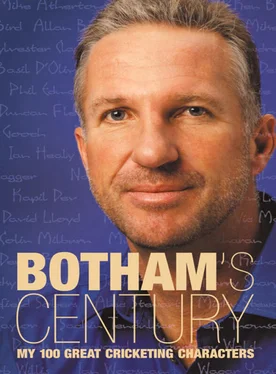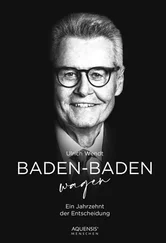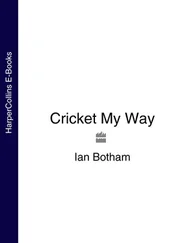‘You want to talk to me?’ asked Curtly.
‘Yes I do,’ replied Norrie.
‘OK. This is how it works. You want to talk to Viv, you ask Viv. You want to talk to Curtly, you ask Curtly’
‘Fine,’ said Norrie, ‘I follow you. Sorry about the misunderstanding. I thought it might be better if I went through Viv.’
‘Fine,’ said Curtly. ‘No problem.’
‘Fine,’ said Norrie. ‘So, can I talk to you?’
‘No,’ said Curtly, ‘Curtly talks to no one.’
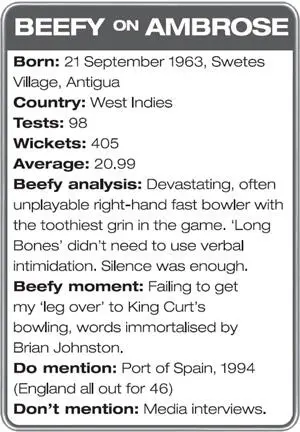
I can still hear the big man cackling now as he does every time he reminds me of the famous incident at the Oval in 1991, when Jonathan Agnew and Brian Johnston immortalized my failed attempt at getting my leg over the stumps against his bowling.
Interestingly, he saved some of his fiercest stuff for his fellow West Indians; either in Caribbean domestic cricket for the Leewards, or in the county championship for Northamptonshire, and I believe that was because, like Viv and Andy Roberts before him, he was immensely proud of being able to place the name of one of the smallest of those islands on the sporting map.
Think of the sights and sounds of cricket in the twentieth century and the voice of John Arlott will come to you without prompting.
From the end of World War II to the time of his retirement in 1980, John’s gravelly Hampshire burr and the thoughts and feelings it conveyed were more than just those of the professional commentator. For the millions in England and around the globe whose main, and sometimes only, contact with the game they loved was live reporting on BBC Radio, John represented the heart and soul of cricket.
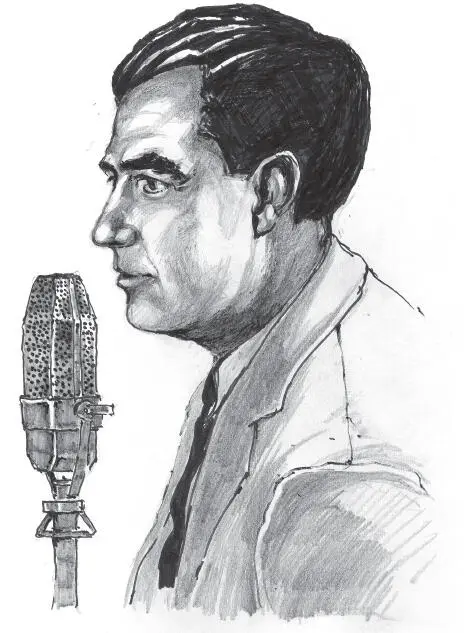
In all that he did and all that he was, John was a gentleman and a gentle man. Imbued with a humility sadly too rare in those who make their living conveying their views on cricket through the broadcast media or in print, one of John’s great qualities was that he never believed he knew it all.
In general, and for obvious reasons, professional cricketers have always enjoyed a healthy scepticism about the views of those who have not played the game to their standard. But John was the exception that proved the rule. He earned the respect of players because, while on occasion he could be highly critical when he felt the need, he never talked down to them. In discussion, however, up to the latter part of his life, by which time bad health and melancholy had taken their toll, his almost schoolboyish enthusiasm for the game and the way he felt it should be played left people in no doubt as to the depth of his passion. In that respect, a chat with John was invariably a tonic and always left you wanting more.
As for his broadcasting, his reputation as the master was well deserved. He knew the power of silence and had the priceless ability to say more worth listening to in a few words than most of his rivals could muster if they talked all day and all night.
My first recollection of listening to his commentary as a lad exemplified that skill. Charlie Griffith, the ferocious West Indies paceman who terrorized the best batsmen in the world in the late 1950s and through the 1960s, was past his best when he toured England in 1966. But he was still plenty quick enough. What is more, for years many had suspected, and others even gone on record to state that, from time to time, he chucked his bouncer. So, while John was on air, when Charlie unleashed one on tail-end batsman Derek Underwood (breaking the unwritten rule of those pre-helmet days that bouncers were not bowled at guys down the order who were unable to defend themselves, let alone chucked at them) the sadness and anger in John’s voice were impressively moving, even to the ears of an eleven-year-old.
‘Oh, no, no, no, no, no, no, no,’ John growled. Then he paused for what seemed an eternity, before adding: ‘Griffith has thrown in his bouncer.’
The double-meaning was quite deliberate and it left you in no doubt as to how far John believed Charlie had overstepped the line. Listening to him was almost scary. He sounded like a policeman issuing a final warning to an errant teenager in the days when that meant something. You could tell how good John must have been at his first job, a country copper on the beat.
My first encounter with John came when I was a sixteen-year-old on the Somerset groundstaff. I arrived at the county ground in Taunton one morning to perform the usual duties of looking after the first-team guys and fetching Brian Close his fags and a copy of The Sporting Life , when I was approached by the secretary, Jimmy James, who told me he had a job that needed doing.
I was to meet Mr Arlott of the BBC in the car park and help him take his equipment up the rickety stairs to the radio box. Until that moment I hadn’t realized they made lip-mikes and earphones out of glass. Once there, John thanked me, sat himself down, opened up the basket, laid out his French bread, cheese and pâté, popped open one of the bottles of claret, offered me a glass and began the first of a thousand conversations we enjoyed over the next 20-odd years. I never forgot the gesture.
Like every other cricket-mad youngster I knew who John Arlott was, but he wouldn’t have known this no-account young scruff from Adam. Yet he took the time and the trouble for a convivial chat, and gave me the impression he was genuinely interested in what I had to say. The wine and cheese were delicious, too.
John was a man of strong opinions and he expressed them forcibly. If he felt someone deserved criticism he would not shirk from making it, as he proved when filling in the section entitled ‘race’ included in the immigration form for entry to South Africa just after the Second World War. ‘Human,’ he wrote. But his most enduring quality was a generosity of spirit that never ceased to amaze those who knew what sadness he’d had to endure in his personal life.
Until his dying day John wore a black tie in remembrance of the son who died in a car crash in the sports car John had given him for his 21st birthday. And towards the end of his life chronic emphysema meant that he needed constant medical care and the use of a nebulizer. For a man who was blessed with such wonderful powers of communication and conversation, the frustration of having to take minutes to say only a few words must have been unimaginable.
There is no doubt that by the time he decided to quit in 1980 he had fallen out of love with some aspects of the modern game. He never rammed the old days down your throat, but, although he understood the players’ perspective over the Packer affair that split the game, he longed for gentler, less materialistic times. He loved the way I approached cricket, for instance, which was to try to win, while having fun as well, and he feared that as time progressed the fun simply would not survive.
He took his leave from his devoted listeners in typically undemonstrative fashion. Declining the offer from Test Match Special producer, Peter Baxter, to do the final stint of the Centenary Test between England and Australia at Lord’s in 1980, he stuck to the rota he had adhered to for donkey’s years and finished with: ‘… and after a few words from Trevor Bailey, it will be Christopher Martin-Jenkins.’ And when the man on the public-address system announced to the crowd that John had made his final broadcast for Test Match Special , he missed the applause led by the players on the field because he was at the back of the commentary box being interviewed for the PM programme.
Читать дальше
